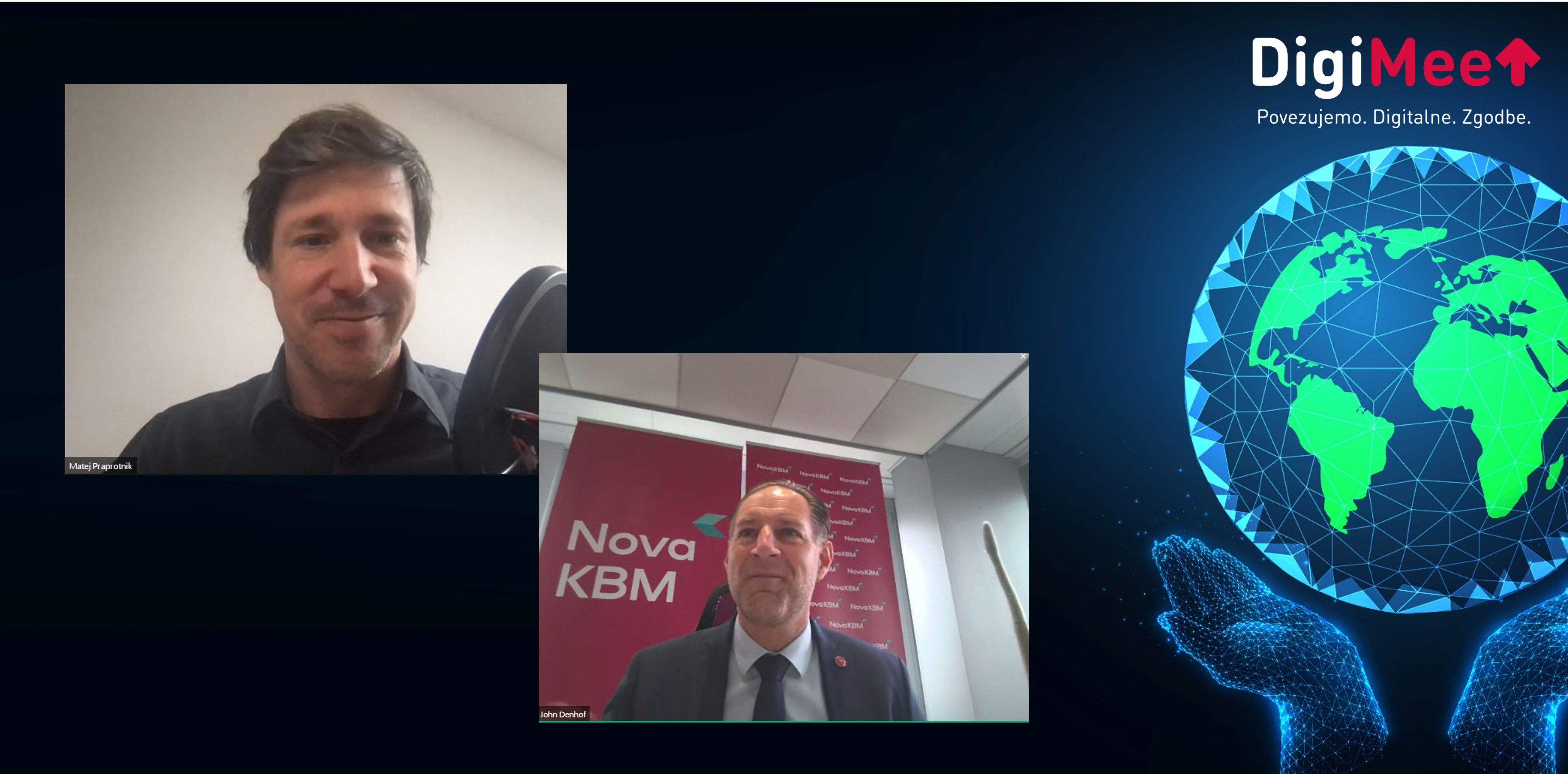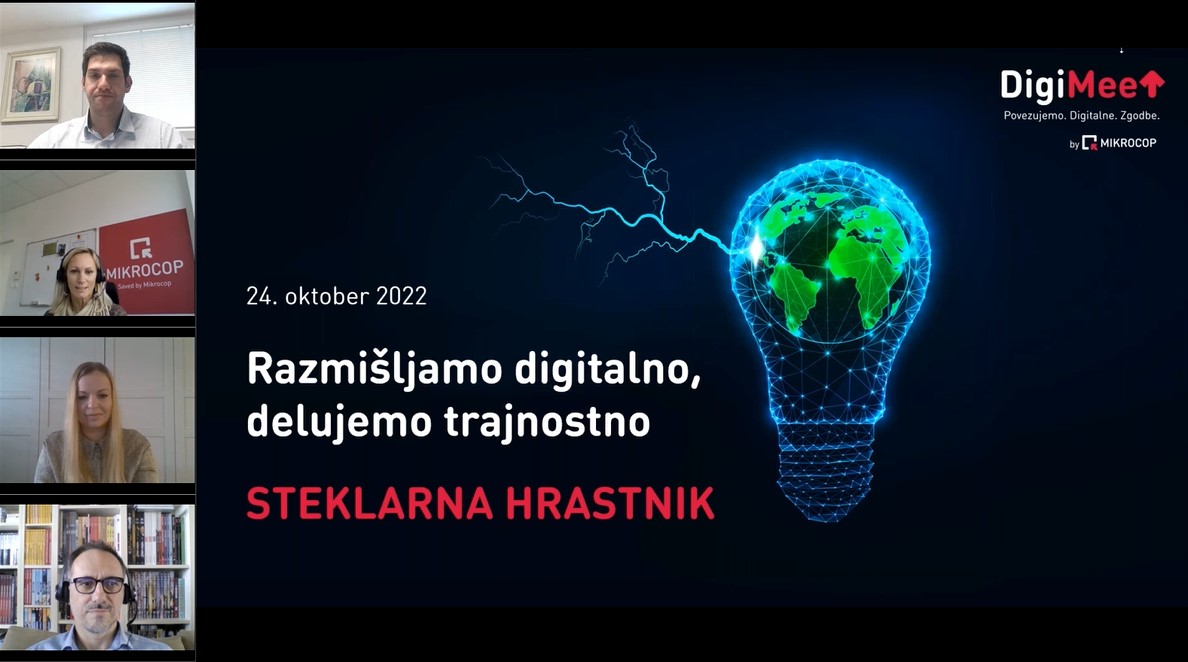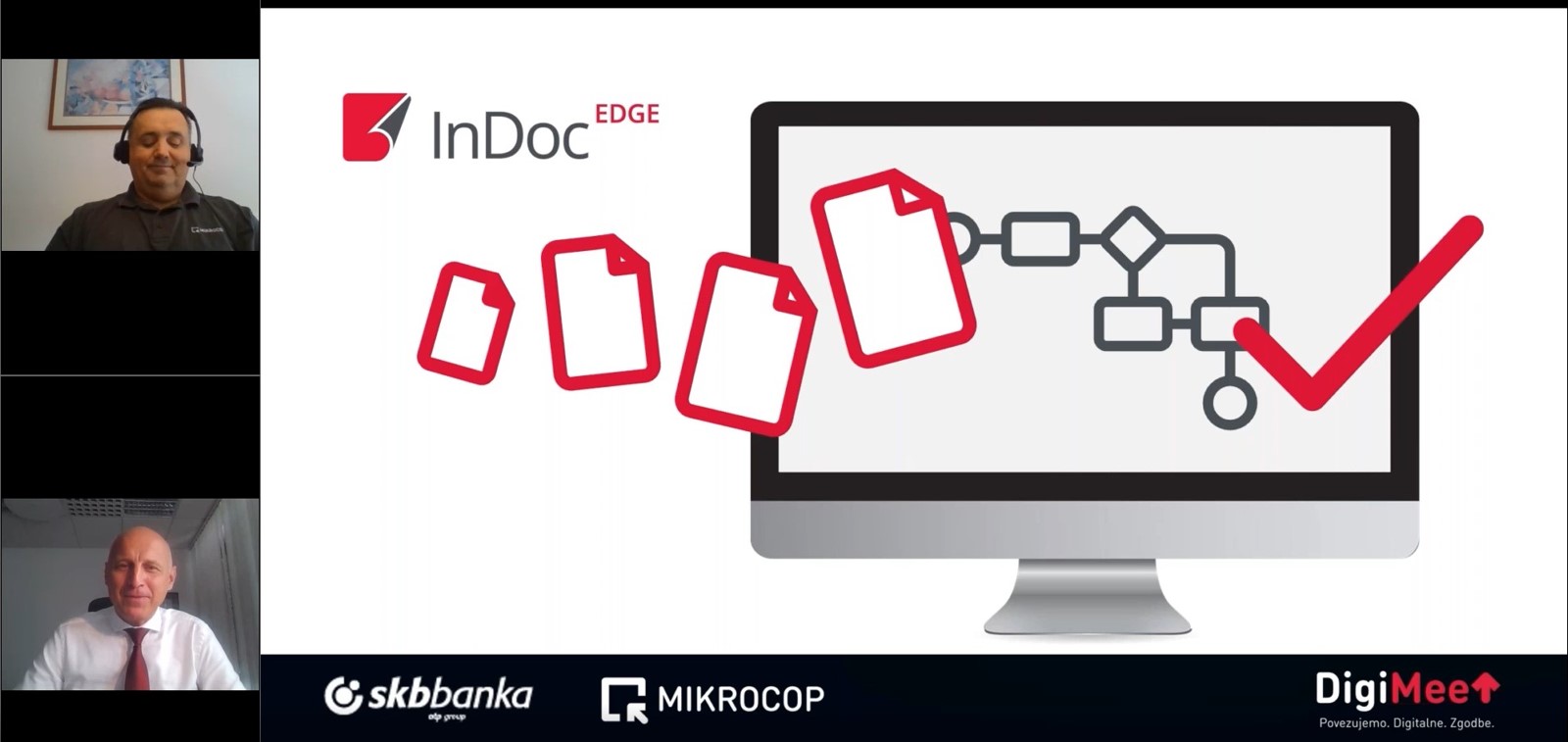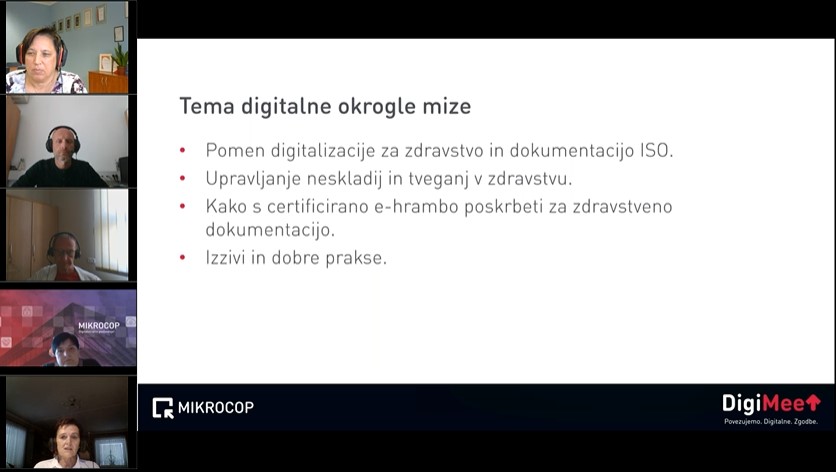DigiMeet 2022 - four days of relevant content, interesting guests, and numerous ideas for business digitalization
After four days of seminars and productive debates, we have successfully brought to an end this year's online DigiMeet 2022 event 'Sustainable Future with the Right Digital Support'. At DigiMeet we talked with our partners to provide an overview of the digitalization in the glass production industry, banking and healthcare, and to look at digitalization through the lens of environment protection.
Simona Kogovšek, CEO of Mikrocop, said she was pleased to see more and more companies embracing digitalization as an opportunity for internal and external growth, with full awareness that digitalization comes with a promise of more sustainable business operations.
This observation was confirmed in an exciting open debate by the moderator and radio journalist Matej Praprotnik and John Denhof, Chairman of the board of Nova KBM. "Originally, the term sustainability was only used in the context of conservation of nature, forests and crops, while today it also describes sustainable business models. It affects all people, companies, sectors and countries. In the past boardroom discussions centered on margins, returns and financial metrics, but today they are increasingly revolving around how to respond to climate change", said Denhof.

Nova KBM honors its commitment to sustainability agenda, which is also implemented in its business strategy. In the last five years, the bank has started a transformation and redesign of its business models, relationships with regulators, and products. Moreover, it has set up a clear action plan, which is being effectively carried out. Employee appraisal and remuneration system is also linked to sustainability agenda as it further contributes to building employee awareness. Nova KBM firmly believes that the vision has to be lived, monitored and measured, since the ESG (Environmental, Social and Governance) concept is no longer just a theory; instead, all the areas (including information technology) have to be harmonized also in practice.
"Mikrocop was incredibly supportive in our journey to paperless office. In one of our first projects, we aimed to transform the business environment of our branch offices, where lots of printing and scanning was being done. When I joined Nova KBM, we were dealing with so much paper that we had to buy a forklift – as if we were a newspaper house and not a bank. Now our operations are 99 percent paperless. Besides, cutting down on paper usage turned to be one of the most efficient cost-cutting strategies," he added proudly.
The aim of Nova KBM bank is to cut its carbon footprint by 7 to 10 percent every year. "The first years were easier, as we managed to reduce our carbon emissions by 25 percent just by replacing insulation, lighting, infrastructure... Now it's harder. To achieve carbon neutrality, we will need to produce our own power from energy-efficient sources. But this is a challenge that other companies will also need to tackle when it becomes a requirement imposed by regulators and legislators. In the future paying carbon tax will be mandatory, like any other taxes," said Denhof.
At the first DigiMeet 2022 webinar, Ivo Vasev, InDoc EDGE Project Manager, and Tilen Sever, Director of Technology Development and Innovations at Steklarna Hrastnik, presented the opportunities provided by the digital platform as a tool and foundation for digital transformation. They also underlined the connection between digital strategy and vision on the one hand and the company's focus on sustainability on the other.
Steklarna Hrastnik adopted a strong commitment to addressing the challenge of carbon neutrality, since, as Tilen Sever told the audience, glass production is a highly energy intensive industry. The company's progress towards this goal is driven by innovations, such as the award-winning project on the use of hydrogen in melting glass.
"If you are not investing into digital transformation now, you are already falling behind. We need to optimize our processes, which may affect our material and energy consumption. Green transformation puts emphasis on better energy efficiency, renewable energy, electrification, renewable fuel and green innovations," added Sever.

Steklarna Hrastnik and Mikrocop have partnered in the digital transformation project called Cedit.si, which will enable Steklarna Hrastnik to maximize its digitalization progress and will also positively affect its sustainable operations. According to Ivo Vasev, Mikrocop will set up digital collaboration between key stakeholders (employees, partners, customers, etc.), which will be secure, compliant, easier and more efficient. Signature functionalities of Mikrocop's InDoc EDGE platform include document capture and classification, business process management, document and content management, digital transactions, safe and compliant e-storage, and connectivity with various ERPs or specific external services.
Several years ago SKB Bank also searched for a solution that would provide safe and compliant sharing of documents for faster and more effective work. They teamed up with Mikrocop, which successfully digitized over 100 different processes, ranging from simple (e.g. approval of annual leave utilization) to more complex (consumer loan approval process).

Miro Cepec, Chief Operating Officer of SKB Bank, said at DigiMeet that digitalization is even more important for banks than for other entities as they are subject to very strict confidentiality requirements. Furthermore, nearly all bank communication contains certain elements of trade secrets.
"We were looking for a partner who could tackle a process of such complexity and would be able to respond to our needs within the shortest time possible. We were impressed with the way Mikrocop embraced the challenge and managed to develop advanced functionalities to assist our transition from simple storage to advanced processes, never compromising on our commitment to support the least able participant, or the weakest link, in all the steps of the process."
Another interesting event was the round table on digitalization in healthcare, which was hosted by Nataša Centa, Digitalization Specialist at Mikrocop. Ms Centa initially pointed out that digitalization in healthcare is inevitable. It adds to the transparency of the healthcare system and increases patient safety and hospital efficiency, while facilitating data management and transparency and promoting secure storage of health records.
"The processes of healthcare generate huge quantities of sensitive data that affect the patient treatment process. Data may either facilitate or hinder this process. As developers of the Hipokrat solution we are aware that it is of key importance to ensure that all data is kept in the information system so it can be used in the process of healthcare whenever needed," said Mirjam Kerpan Izak, Director of List.

"By digitizing information, documents, and processes, they become easier to manage and supervise. We can also control access and generate audit trails, which enables monitoring of users who access certain documents. Adding new users is also very easy," reported Maja Marušič, Internal Rules and E-Storage Specialists at Mikrocop.
Gregor Torkar, Head of IT at Jesenice General Hospital, said that in his practical experience the healthcare system contains more and more data which passes through various systems outside the hospital, as well as between medical appliances. That considered, the main emphasis is on secure connection, optimization of certain processes, and analytics.
Aleš Rozman, MD, Medical Director of the Kranj Gynecology and Obstetrics Hospital, agreed and added: "For me as a user it is also important that as a healthcare provider I have direct access to all patient data on the spot. On the other hand, I also need access to the information that I need in my decision-making process."
Another important feature is the digitized non-compliance management process and a risk register, both supported by InDoc EDGE, which provide a comprehensive overview of the entire system. "Before it took me a lot of energy to compile all the data from various sources. Now everything runs through a single system which all employees can access and report any non-compliance detected. At any point in time, Head of Quality can see where issues and risks arise and can mitigate them in time," explained Aleš Rozman.
When asked what they see as the final goal of digitalization, Aleš Rozman said that the informatization will only be finished when all data is digitized and when work can be fully paperless. Gregor Torkar pointed out the importance of harmonizing code lists at the national level so that solution providers can continue to work on connectivity of solutions and exchange of data, which will considerably simplify healthcare processes.
Mirjam Kerpan Izak and Maja Marušič agreed that digitalization will never entirely end, even when all data is available in digital form. As technology continues to evolve, continuous optimization of processes will be required. However, the final goal is to ensure that patients will receive the best possible care because all patient data will be available to doctors and other healthcare professionals at any moment.